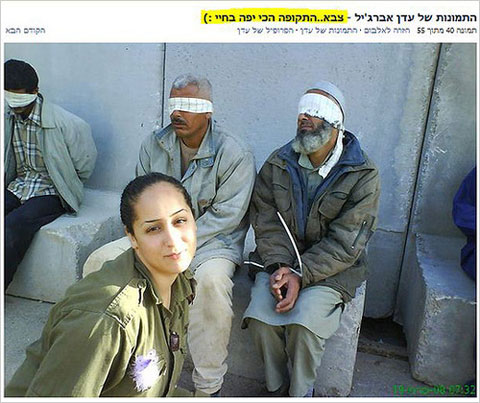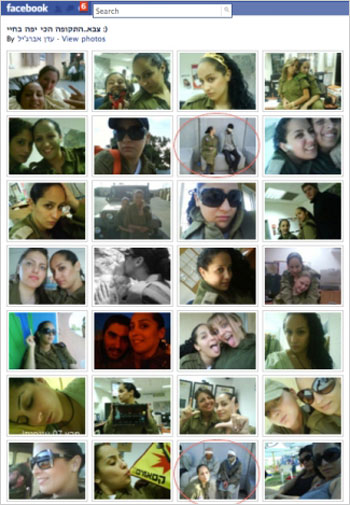The most moral army in the world
IDF soldiers caught behaving badly
One: the Thefts
Two: the Photos
 Magnes Zionist update: Captain Renault of the IDF once again reacts: “I’m shocked, shocked to find gambling going on in this establishment!” Read about it here
Magnes Zionist update: Captain Renault of the IDF once again reacts: “I’m shocked, shocked to find gambling going on in this establishment!” Read about it here
 First Murder, then Theft and Lies from the “World’s Most Moral Army”
First Murder, then Theft and Lies from the “World’s Most Moral Army”
Written by Greta Berlin | 21 August 2010
[see also: IDF soldiers suspected of theft from Gaza flotilla ship, Haaretz Service, 18 August 2010
[London, August 21, 2010] An investigation revealed by Israeli news sources confirms that an Israeli military officer and soldiers stole and sold laptops belonging to passengers on board the Freedom Flotilla, which was illegally boarded by Israeli forces on May 31, 2010.
The Israeli military now claims that “[t]he IDF did not receive complaints of stolen computers after the Navy raid on the Gaza-bound flotilla,” and is suggesting that “the civilians who were on the ships chose not to complain in light of the complicated incident they had gone through.”
The Free Gaza Movement, one of the organizers of the flotilla, says that statement is patently untrue. Passengers immediately filed complaints with their consular representatives and embassies about possessions taken from them. They also submitted extensive affidavits to lawyers, and reported it to the media: millions of dollars’ worth of computers, cameras, phones, cash, jewelry and other equipment was taken, and none has been returned. Embassies have repeatedly told us that they are in touch with the Israelis about getting our belongings back.
Col. Ann Wright, one of the passengers on board the U.S. flagged ship, Challenger 1, stated, “Since the U.S. State Department has assured me that they are in touch with the Israeli authorities about our belongings, I expect that they would respond to these articles that say the Israeli government did not know that passengers were missing any personal possessions.”
In addition, our lawyers at Adalah have been corresponding with the Israeli military authorities about the missing personal property, including computers. Therefore, it is a deliberate lie to say they have not received any complaints.
“Many of these computers, cameras and phones may contain vital evidence of Israeli military crimes committed during the attack on our ships,” said Free Gaza chairperson and attorney Huwaida Arraf. “Despite repeated requests, Israel has refused to return the equipment or turn it over to the United Nations. Instead it has stolen documents from our computers and cameras to use for propaganda purposes.”
While the actions of the officer and soldiers who stole and sold a half dozen laptops is reprehensible, it is Israel’s military and political leaders that must be held accountable for the larger crimes of aggression, murder, unlawful detention, bodily harm, confiscation and pillaging of property, tampering with evidence and more. All of these issues are being pursued by lawyers in Europe, Turkey, and the United States.
Contact: Huwaida Arraf, +970-598-336-215
Col. Ann Wright +1 808 741 1141
Audrey Bomse, legal coordinator +44 786 156 0932
Adam Shapiro +1-202-294-8813
 Israeli Bloggers Copy Controversial Images From Facebook
Israeli Bloggers Copy Controversial Images From Facebook
By ROBERT MACKEY, 16 August 2010
followed by Robert Mackey’s update on 17 August Israeli Ex-Soldier Defends Her Facebook Snapshots

A screenshot of a former Israeli soldier’s Facebook page posted on Sachim, an Israeli Tumblr blog on Monday.
Israeli bloggers moved quickly on Monday to make copies of a pair of controversial images posted on Facebook by a former Israeli soldier — showing her posing next to blindfolded Palestinian prisoners — before she blocked access to her photographs, which were shown and discussed on Israeli television before the day was out.
As my colleague Ethan Bronner reports, the soldier, Eden Abergil, who completed her military service last year, posted two images of herself in a Facebook album she called “The Army… the most beautiful time of my life :).”
The images were quickly duplicated and posted on the Israeli Tumblr blog Sachim, which, according to the Israeli blogger Dimi Reider, “tracks the character of the young, pseudo-liberal Israeli mainstream.”
The photographs, which evoke some of those taken at Abu Ghraib of the American soldier Lynndie England with blindfolded Iraqi prisoners, are not as overtly sexual as those notorious images, but Mr. Reider reports that Ms. Abergil’s banter on Facebook with her friends about the images did include jokes about one prisoner’s genitals.
Mr. Reider wrote:
Theses pictures really do speak for themselves; of course, Abergil is no better or worse than thousands of other Israeli soldiers, and I’d like to hope a few years from now she’ll be appalled, rather than amused by the memories. We may and should cut slack to the effect of conflict on a young person’s sensitivity and moral standards – Abergil by no means should be scapegoated for all excesses of the IDF – and remember efforts by separate individuals, even in uniform, to make an intolerable situation more bearable.
But we should always remember that this, only this and nothing else, with its ignorance, naive bigotry, and blunt power-play – is the real face of our occupation of the West Bank.
To put the images in context, Mr. Reider also posted this screenshot of Ms. Abergil’s album of snapshots from her military service:
In two late updates to his post, Mr. Reider noted that Ms. Abergil had not responded to his request for comment but did tell another blogger, Dan-ya Shwartz, “I don’t understand why it’s any of your business to go prying through people’s Facebooks and always find the bad. [Go] deal with more important matters.”
She later refused to discuss the matter with Lisa Goldman, an Israeli-Canadian blogger, telling her: “I don’t speak to leftists.”
Another Israeli blogger who wrote about the images on Monday, Yossi Gurvitz, wrote that the images were captioned with the word “Gaza” on Facebook by the photographer, suggesting that they were taken in or near the Palestinian territory.
______________________________
Israeli Ex-Soldier Defends Her Facebook Snapshots
Robert Mackay, 17 August 2010
Snapshots taken by Israeli soldiers of captured or killed Palestinians were posted on Facebook by Breaking the Silence, an Israeli human rights group on Tuesday.
Updated | 3:07 p.m. In an interview with Israeli Army radio on Tuesday, a former Israeli soldier said, “I still don’t understand what’s wrong” with photographs she posted on Facebook of herself posing next to blindfolded Palestinian detainees.
The Israeli newspaper Haaretz reported that Eden Abergil, who posted the images in an album dedicated to her time in the military — called “The Army… the most beautiful time of my life :)” — said that the “pictures were taken in good will, there was no statement in them.” She added that they were not intended to humiliate the prisoners but merely to document her “military experience,” and that she had no idea they “would be problematic.”
As The Lede explained on Monday, Ms. Abergil’s photographs were quickly duplicated by Israeli bloggers she described as “leftists,” and the images were shown and discussed on Israeli television after they came to light.
Although Ms. Abergil, whose compulsory military service reportedly ended last year, seems to have no regrets about her snapshots now, the Israeli blogger Dimi Reider suggested that she may feel differently in the years ahead.
On Tuesday, Mr. Reider pointed out that “To See If I’m Smiling,” a harrowing documentary produced in 2007 by a former Israeli soldier, Tamar Yarom, illustrated how much memories of military service can shift with time.
The documentary, which can be viewed online, is based on the testimonies of six women who struggle to deal with memories of their service in the Israeli military. One of the women, Meytal Sandler, a former medic, described being haunted by an image she had posed for next to the body of a Palestinian man.
Tamar Yarom/Women Make Movies Meytal Sandler, a former Israeli Army medic, recalling a traumatic event in a documentary on women who served in the Israeli military.
In the film, Ms. Sandler described the night the photograph was taken:
There’s a shooting battle and again there’s a dead body. And what is by now a normal procedure, we take the body put it near the latrines and wash it. Then, something very funny happens: he has an erection. A dead body with an erection. We laugh a little because it’s embarrassing. And… it’s open grounds, so anyone come and take a peek. Some female sergeants that I knew arrive from the operations room come in. One of them has a camera and without even thinking, I tell her, ‘Come, take my picture.’ And I sit down next to the dead body and… I have my picture taken.
As she described the memory, Ms. Sandler looked haunted and on the verge of tears. But the film includes video of her at a party marking the end of her military service — reading a letter from the other soldiers who tell her, “You know that we love you,” showing off a gift, dancing to electronic music — to illustrate how differently she felt about her stint in the army at the time.
Later, she told the filmmaker:
I’m not sure when it was, but at some point, I became very ashamed of that picture. And… I didn’t tell anyone about it, that it existed. I forgot about it a little. But I would like to see it. To see if I look different. I want to see if I’m smiling.
Near the end of the documentary, as she prepared to look again at the photograph, which had not been in her possession, Ms. Sandler said: “Who wants to deal with the evil within himself, the alienation? Who wants to deal with that? Dealing with these questions is painful.”
In the same film another former soldier, an education officer named Dana Behar, also described snapshots being taken with the bodies of Palestinians, in Hebron:
I’m washing dishes in the kitchen, which is what I did most of the time, suddenly there’s this commotion and I hear the guys coming in and I understand that they’ve returned with something — they’re not empty-handed. I dry my soapy hands and go outside to see what’s up. I see they’re back with dead bodies of terrorists, on stretchers, that were covered.
They say, “Yep, we’ve got some terrorists’ bodies here.”
I’m like, “What? Cool… What?”
It really deterred me, this unexpected presence of death. Then they pulled out cameras and took pictures with the bodies. I thought: “It’s wrong to take pictures with dead bodies.” On the other hand it wasn’t terrible enough to make me call a journalist and say: “Oh dear, they’re taking pictures with dead bodies, we need to alert the world. …”
I didn’t think for a moment that taking pictures was normal. It’s not normal. But the reality of the territories isn’t normal either. Everything that happens there isn’t normal but somehow… it works. A minus and a minus make a plus. Abnormal and abnormal work. It fits.
Although an Israeli military spokesman denounced Ms. Abergil’s snapshots as “base and crude” on Monday, Israeli human rights groups agreed with her description of them as far from unusual. Ishai Menuchin, who leads Israel’s Public Committee Against Torture told Haaretz:
These terrible photographs reflect a norm in the way Palestinians are viewed, as an object and not as humans. It is an attitude that ignores their feelings as humans and their individual rights.
On Tuesday, Breaking the Silence, an organization of Israeli veterans that collects testimony from soldiers who served in occupied Palestinian territories, added one of Ms. Abergil’s images to a new Facebook album of similar photographs — some quite graphic — taken over the past decade.
As The Jerusalem Post reports, the group’s collection of images bears a note referring to the Israel Defense Forces spokesman who suggested that Ms. Abergil’s images are unusual:
Unsurprisingly, the I.D.F. spokesman released a ’shocked’ statement saying that this is the “shameless and ugly behavior of one soldier.” This picture is not the ugly behavior of one person, but a norm throughout the army… that is a result of military rule over a civilian population over a long time.
The group’s statement continued:
We suggest to the I.D.F. spokesman not to insult the intelligence of the Israeli public, and to clarify that this is a widespread phenomenon, not an unusual incident by one soldier. We attach similar pictures taken in different times and areas over the past 10 years.
These pictures are only the first collection. Taking real responsibility is not blaming the lowest ranks, but honestly confronting with the deteriorated moral state of the senior commanders responsible.
Another Israeli military spokesman, Barak Raz, told the BBC on Tuesday, “These are disgraceful photos…. We’re talking about a serious violation of our morals and our ethical code and should this soldier be serving in active duty today, I would imagine that, no doubt, she would be court-martialed immediately.”
Ghassan Khatib, a spokesman for the Palestinian Authority said in an interview with the BBC, “This picture of an Israeli soldier enjoying humiliating Palestinian prisoners is an example of the day to day life of the Palestinian people under occupation. It indicates that occupation is [a] cause of suffering, and humiliating, for the Palestinian people every day and it is an indicator [of] the fact that occupation also corrupts the Israelis.”
Speaking to the military radio station on Tuesday, Ms. Abergil, whose compulsory service ended last year, refused to accept any responsibility for harming Israel’s international reputation, saying:
We will always be attacked. Whatever we do, we will always be attacked.
Later, Ms. Abergil told Ynet News, an Israeli news site, that the military had informed her she would be dismissed from reserve service and stripped of her rank. Since “the army let me down,” she said she does now have one regret: “I’m sorry that I served in such [an] army.”


